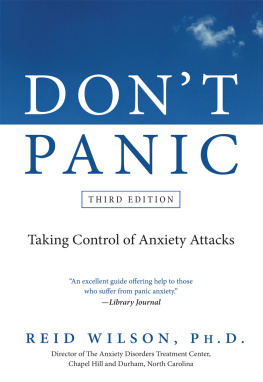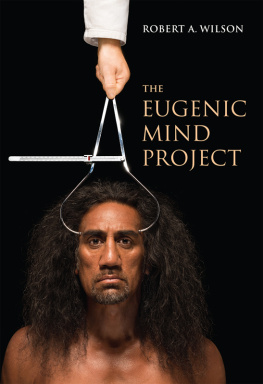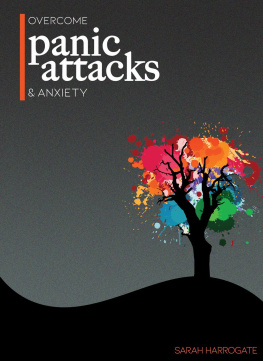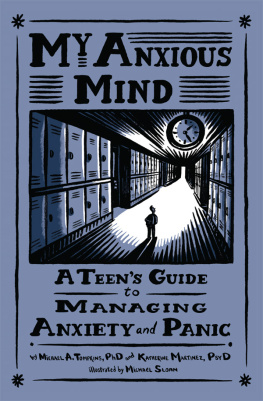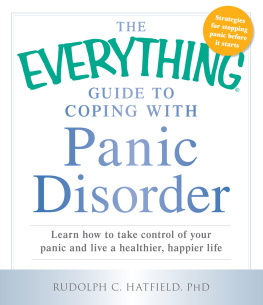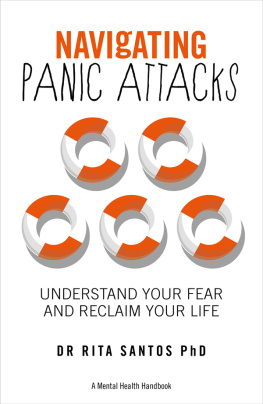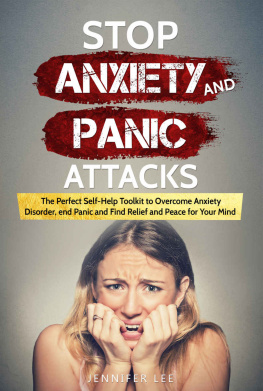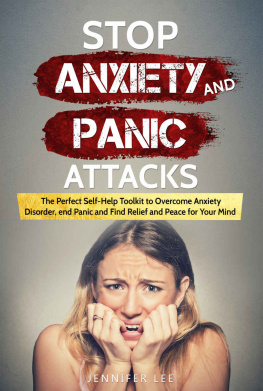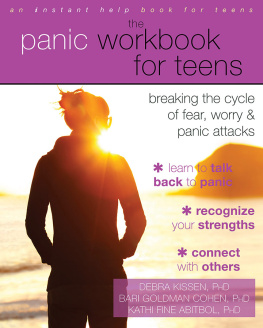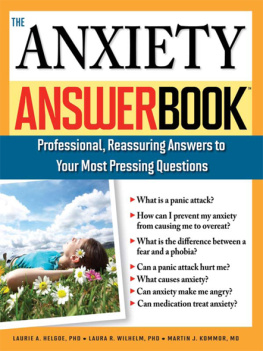Reid Wilson, Ph.D.
Dont Panic
Third Edition
Taking Control of Anxiety Attacks

To
brother Phill Wilson and
sister Karen Ann Christenbery
Contents
Identifying the Problem
Introduction: The Panic Attack
Physical Causes of Paniclike Symptoms
Panic within Psychological Disorders
Agoraphobia and the Panic-Prone Personality
Four Complicating Problems
Panic in the Context of Heart and Lung Disorders
The Nature of Anxiety Attacks
The Anatomy of Panic
Whos in Control?
Why the Body Reacts
Dont Panic Live: Your Moment-by-Moment Strategies
Grab a New Attitude
Experience: The Greatest Teacher
Look for More
Stand without Crutches
Talk to Panic
Support When You Need It
Your Minds Observer
Find Your Observer
Take a New Stance: Your Supportive Observer
Take the Hit
Face Panic
The Use of Medications
P ursuing a career in clinical psychology fulfills two of my most cherished lifelong dreams: to continually explore the world of ideas as an eager and naive student and simultaneously to give to others in a way that makes a difference. This book is a reflection of a lifetime of learning, and I hope it in some small way honors those who have nourished and inspired me. Theoretically, it is a synthesis of the work of hundreds of dedicated professionals in a surprisingly broad spectrum of fields. I had planned to acknowledge every gifted professional I have had the honor of directly studying or working with in the fields of anxiety, strategic and paradoxical treatment, and positive psychology. After thirty-five years of being powerfully influenced by the work of others, the list grew to 140, and I surrendered to the page limits granted me here. I am humbled by the gifts of my teachers throughout my professional life.
Rich Simon, PhD, personally guided my writing style in such a way that I have returned to the excitement of being a writer after ten years of frustration. Jeff Sapyta, PhD, synthesized the newest research in the field with skill and adeptness. My clean team of Ginger Gialanella, MS, Joanna Wilson, BFA, Mike Gialanella, MS, Camille Bell, RN, and Brian Leahy, BFA, commented on the readability of all my new chapters. John Ware, my agent and friend, always offers just the right support. And the baristas at Open Eye Cafwith its assorted music, children, runners and bikers, discussions and banterkept me focused and happy throughout this year.
I have long felt the care of my Ericksonian friends, Michael Yapko, PhD, Stephen Lankton, MSW, and Jeffrey Zeig, PhD, and my closest buddies in the anxiety field, Jim Wilson, MA, Sally Winston, PsyD, and Marty Seif, PhD. My friends and colleagues at the Anxiety Disorders Treatment CenterAnnette Perot, PhD, and Julie Pike, PhDinspire me with their creativity. Sylvia Lloyd keeps me on schedule and stays on top of all the office technology. I am grateful to the staff of the Countway Library at Harvard University Medical School and the Health Sciences Library at the University of North Carolina for the use of their valuable resources.
My four lifelong friendsWilliam Bud Garrison, Alan Konell, Bruce Buley, and Frank Colehave joined me in adventures that have opened my heart, expanded my perception of the potential of life, and given me the gift of self-love. Robert and Ann Wilson have long been my steadfast, loving supporters. Bentha Wilson continues to inspire me with her extraordinary blend of optimism, generosity, and assertiveness. Patrick and Joanna Wilson, Im happy to say, love me always.
Reid Wilson, Ph.D.
Chapel Hill, North Carolin
June 2008
P anic sufferershope is on the way. In this new and updated edition of Dont Panic , Dr. Wilson explains why you suffer from this debilitating form of anxiety and precisely what you need to do to recover from it. He has drawn from both the latest research on panic and his vast experience successfully working with panic patients to develop a protocol that works. And he teaches you how to implement this effective program, step-by-step.
Panic attacks can be intensely frightening and demoralizing. In the midst of one, you may believe that you are about to die, lose control, go crazy, or experience another catastrophic outcome. Even though you may have had dozens or even hundreds of panic attacks, and find that the catastrophe you fear never comes true, why, then, do you still fear panic? As Dr. Wilson explains, you have maladaptive (unhelpful) attitudes and behaviors that keep the disorder going. You are sure, despite all evidence to the contrary, that the next time a catastrophe is highly likely to happen. So you avoid experiences that may provoke panic, and when you cant, you do what you can to diminish your panic symptoms. In this way, you never learn that while panic can feel intensely distressing (both physiologically and psychologically), it simply isnt dangerous (absent an extremely serious medical condition such as chronic obstructive pulmonary disease).
Dr. Wilsons book will help to dispel the fear and confusion that accompany panic attacks. In Part 1, you learn what a panic attack is, why you experience intense and rapid physiological changes, and how to differentiate panic from organic conditions. Dr. Wilson describes the similarities and differences between panic and other anxiety disorders. He also demonstrates the power of beliefs about oneself, and how earlier experiences can lead you to feel helpless, vulnerable, self-critical, and dependent on otherswhich sets the stage for the development of panic disorder.
In Part 2, Dr. Wilson describes how panic undermines your confidence, seeming, at first, to strike out of the blue. Because you dont know when you will experience another attack, you remain constantly on guard. But you will learn that panic does not just occur spontaneously. Panic attacks are always preceded by your thinking . If you notice a change in your body or mind, and catastrophize about it (Oh, no! This is terrible! What if I lose control!), you will feel highly anxious. If you then focus on your anxiety symptoms, they can increase in intensity until they reach a level of panic. Over time, you start to dread situations in which you have previously experienced panic. You think about entering a feared situation, anticipate a negative outcome, and doubt your ability to handle the consequences. You feel anxious. Then, you decide either to avoid the situation altogether or to enter the situation but do whatever you can to diminish your physiological arousal. You never learn that even if your symptoms intensify, the catastrophe you fear still would not happen. So when you begin to feel panicky, your body and mind go into full-fledged emergency mode. Dr. Wilson teaches you how to override your emergency response by changing your interpretation of your symptoms and modifying your behavior.
Part 3 teaches you how to adopt a new attitude toward panic. Instead of prolonging your panic disorder by fearing panic, fighting against panic attacks, trying always to avoid panic, and worrying about the recurrence of panic, you will learn how to (1) seek out opportunities to practice facing situations you fear, (2) envision coping with the consequences you fear, (3) modify your tendency to focus on unrealistic consequences, (4) allow yourself to experience panic symptoms without fighting them, (5) reduce your vigilance of symptoms, (6) tolerate uncertainty, and (7) accept the experience of panic and anxiety. Through repeated practice, you will see the value of wanting to feel discomfort and uncertainty so you can prove to yourself that panic, while highly distressing, is not dangerous and that you can handle whatever arises. You will gain a sense of self-confidence and self-efficacy, a cornerstone of independent functioning.

